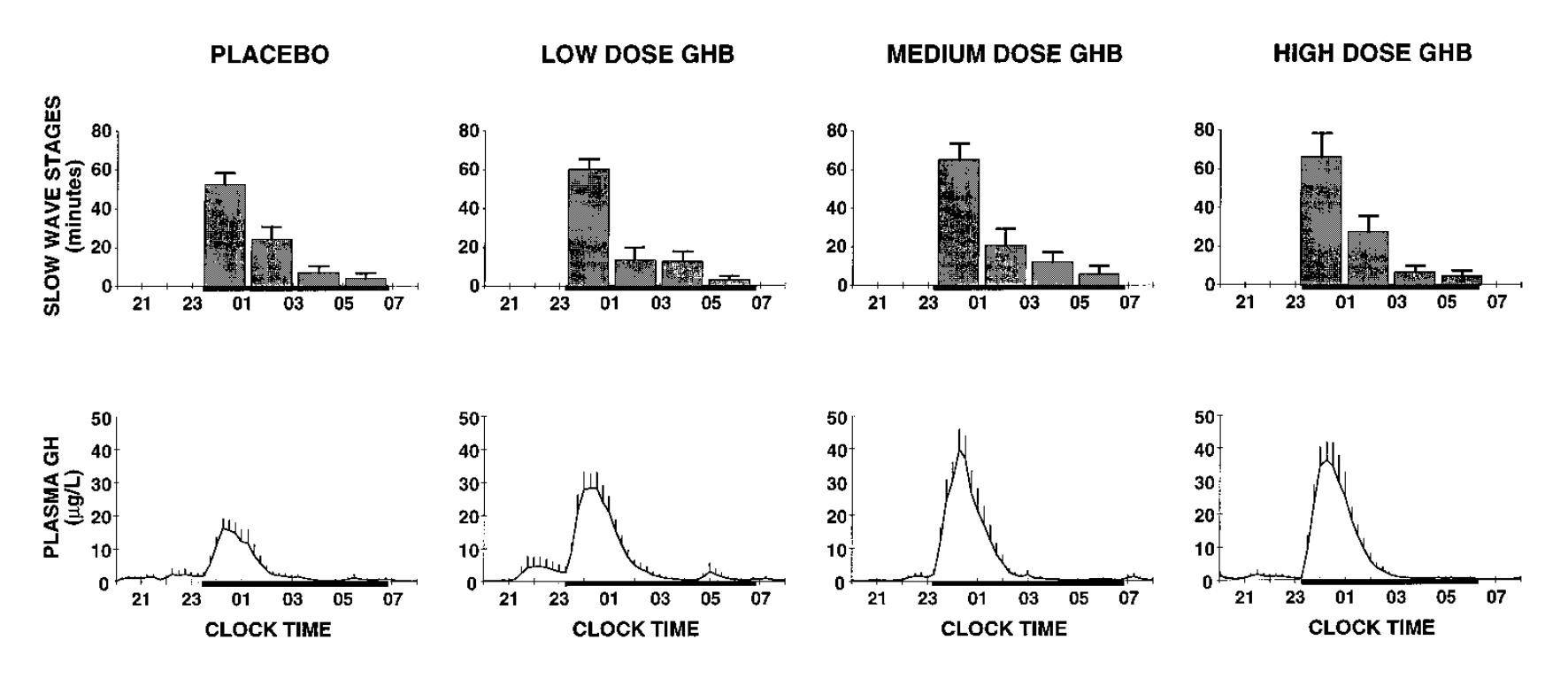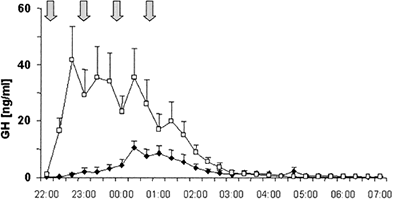Ibutamoren (MK-677) is a drug that may improve longevity, bone density, cognitive ability, strength, and metabolism. It's being investigated for Alzheimer's disease, frailty in the elderly, and growth hormone deficiency.
MK-677 is also used by athletes to gain a competitive edge in sports. MK-677 binds to the ghrelin receptor, mimicking the effects of ghrelin. These effects included increased appetite, muscle mass, bone mineral density, angiogenesis, VEGF expression, protection of the heart, and modulation of glucose and energy homeostasis.
Testing For MK-677
Athletes in competitive sports may be concerned about MK-677 showing up in doping screens.
It's difficult to test for human growth hormone, and very difficult to test for MK-677. You'd need to specifically be looking for it. MK-677 isn't like taking exogenous growth hormone. With MK-677, you're stimulating your own body to produce more growth hormone.
Ibutamoren (MK-677) Cheatsheet
- Mimics the action of ghrelin
- Promotes nocturnal pulses of growth hormone
- Increases insulin-like growth factor (IGF-1) and insulin-like growth factor-binding protein 3 (IGFBP-3)5
- Administered orally (25 mg is typical)
MK-677: The Fountain of Youth?

MK-677 (ibutamoren) is exciting for many reasons.
Studies in Humans
First, it's not an obscure research compound that's only been tested in lab rats. Studies in older adults suggest MK-677 robustly boosts growth hormone secretion and IGF-1 in actual humans.
Orally Bioavailable
Second, MK-677 has advantages over other ghrelin mimetics. It's not a peptide - so it's not degraded in the gastrointestinal tract - and is therefore orally active. You can just ingest 25 mg MK-677. That's a hell of a lot more convenient than injecting peptides!
Promising Health Benefits
The health benefits of MK-677 look promising. Growth hormone declines with aging, and MK-677 has proved in randomized, placebo-controlled trials to reverse this decline 1.
This is a classic approach to longevity research. Figure out what hormones, neurotransmitters or other signals decline with aging. Next, see if restoring levels also reverses the effects of aging.
I first became interested in MK-677 because I was researching the relationship between sleep and growth hormone.
Before I discuss the benefits, side effects, and dosage of MK-677 (ibutamoren), let's back up and discuss growth hormone itself.
TLDR
MK-677 is no fountain of youth; it failed to delay Alzheimer's disease progression and has potential downsides like increased cortisol and glucose.
However, MK-677 is a potent and selective ghrelin mimetic that robustly increases growth hormone. MK-677's effects may prove useful for athletes, the elderly, and nootropics enthusiasts.
Growth Hormone and Sleep
The Physiologic Role of Growth Hormone
Growth hormone is a peptide stress hormone that tends to increase glucose, free fatty acids and insulin growth factor-1 (IGF-1). Growth hormone also stimulates growth, cell reproduction, and cell regeneration in humans.
Nocturnal Growth Hormone Pulses
Healthy teenagers enjoy a large secretory pulse of growth hormone shortly after falling asleep at night. This pulse of growth hormone starts within minutes of the onset of slow wave sleep 3, and begins to taper off in the early morning (e.g., 1 AM to 3 AM).
It should thus come as no surprise that the nocturnal release of growth hormone is controlled by the circadian clock.
Growth Hormone and Slow Wave Sleep
Growth hormone release overlaps with slow wave sleep. The large secretory pulse of growth hormone coincides with the first episode of slow wave sleep. Slow wave sleep is the most essential and restorative aspect of sleep.
Growth Hormone and GHB
GHB (gamma-hydroxybutyrate), a reliable stimulant of slow wave sleep, doubles growth hormone secretion in healthy volunteers 2.
How does GHB boost growth hormone?
There's a quantitative relationship between the amount of growth hormone secreted and the duration and intensity of slow wave sleep.
Athletes can maximize growth hormone release by getting as much high-quality, uninterrupted sleep as possible. Sleep deprivation inhibits growth hormone release.
Since GHB increases slow wave sleep, it makes intuitive sense that GHB would also boost growth hormone secretion.

Since the nocturnal secretory pulse of growth hormone declines with aging, researchers naturally asked whether agonists at the ghrelin receptor or growth hormone itself could reverse aging.
The Ghrelin Receptor
No discussion of MK-677 would complete without mention of the ghrelin receptor. Also called the growth hormone secretagogue receptor (GHSR), this receptor is a GPCR that binds ghrelin. In the brain, the ghrelin receptor is located in the the hypothalamic ventromedial nucleus and arcuate nucleus, as well as in ventral tegmental area dopamine neurons projecting to the nucleus accumbens.

Enter MK-677: A Novel Ghrelin Mimetic

MK-677 is an orally active agonist of the growth hormone secretagogue receptor (GHS-R1a). This receptor is also known as the ghrelin receptor because ghrelin naturally binds this receptor in the body. Ghrelin is the "hunger hormone" because it increases appetite and is opposed by leptin - the "satiety hormone". Ghrelin also regulates energy homeostasis and weight.
MK-677 is potent, long-acting, orally bioavailable, and highly selective for the ghrelin receptor. MK-677 mimics the effects of ghrelin and produces a sustained increase in insulin-like growth factor-1 (IGF-1) and growth hormone. MK-677 is under clinical investigation for the following conditions:
- Alzheimer's disease - results were disappointing4
- Growth hormone deficiency
- Frailty in the elderly - results have been promising
MK-677 and other agonists of the growth hormone secretagogue receptor (GHS- R1a) have appetite-stimulating and growth hormone-releasing effects. Conversely, antagonists have an anorectant effect and may be useful for the treatment of obesity.
MK-677 is not entirely unique; there are a number of other agonists at the growth hormone secretagogue receptor:
- GHRP-1
- GHRP-3
- GHRP-4
- GHRP-5
- GHRP-6
- Capromorelin
- Anamorelin
- Relamorelin
- CP-464709
- Ipamorelin
- Ibutamoren (MK-677)
- LY-444711
- SM-130,686
- Macimorelin
- Alexamorelin
- Examorelin (hexarelin)
- Ghrelin (lenomorelin)
- LY-426410
- Pralmorelin (GHRP-2)
- Tabimorelin
- L-692,585
- Adenosine
- Ulimorelin
- Cortistatin-14
Administration of MK-677 to elderly subjects restores nocturnal growth hormone release to that of young adults. The benefits include increased lean mass and bone density and improvements in strength.
Aging is generally associated with a decline in endogenous ghrelin signaling, which can be restored by agonists of GHS receptor like MK-677.
Does MK-677 Increase Growth Hormone In Humans?
Dr. Nass and colleagues 1 asked whether MK-677 would restore growth hormone in the elderly to the level of young adults. To investigate this question, the authors conducted a two-year, double-blind, randomized, placebo-controlled, modified-crossover clinical trial.
The authors investigated the effect of MK-677 on age-associated changes in body composition, particularly decreased lean body mass and increased body fat. They measured endpoints like changes in fat-free mass and abdominal visceral fat, growth-hormone secretion profiles, and morning IGF-I serum concentrations.
Effects of MK-677 in Older Adults
Nass reported that MK-677 increased growth hormone, IGF-1, fat-free mass, TASM, body weight, total body fat, mean fasting glucose, while decreasing LDL cholesterol.
- Growth hormone. After 12 months of MK-677 treatment, there was a 1.8-fold increase from baseline in 24-h mean growth hormone.
- IGF-1. Serum IGF-I levels also were increased by 1.5-fold
- Fat-free mass. Fat-free mass increased 1.1kg with MK-677 treatment
- TASM. TASM is the total appendicular skeletal muscle mass (limb lean) from DXA; sum of lean soft tissue for arms and legs. TASM decreased -0.3 kg with placebo and increased 0.5 kg with MK-677
- Body weight. Body weight increased by 2.7 kg with MK-677 vs 0.8 kg with placebo.
- Total body fat. Total body fat increased 1.8 kg with MK-677 vs 1.1 kg with placebo.
- Shoulder flexion total work. Shoulder flexion total work decreased with placebo, but there was no decline with MK-677.
- LDL cholesterol. At 12 months, low density lipoprotein cholesterol increased 0.12 mmol/L with placebo, but decreased -0.14 mmol/L with MK-677.
- Glucose. Mean fasting blood glucose did not change with placebo and increased 0.3 mmol/L with MK-677.
Adverse Effects
About 2/3 of participants in Dr. Nass' study treated with MK-677 reported increased appetite vs 1/3 in the placebo arm, consistent with MK-677’s mechanism of action as a ghrelin receptor agonist.
Other adverse effects included:
- Mild transient edema (23% on placebo vs 44% on MK-677)
- Transient muscle pain (9% placebo vs 33% MK-677)
MK-677 Fails To Slow Alzheimer’s Disease Progression
It makes intuitive sense that MK-677 would be tested in Alzheimer's patients. The young enjoy robust nocturnal pulses of growth hormone. Can we make demented patients lucid again with MK-677? Thus far, results have been disappointing.
In animals, insulin-like growth factor-1 (IGF1) increases the clearance of beta-amyloid, a hallmark of Alzheimer's disease (AD).
Serum IGF-1 levels decline with age, and further decrease in Alzheimer's patients. J.J. Sevigny and colleagues4 therefore asked whether MK-677 could decrease the progression of Alzheimer's disease. Their working hypothesis was that since MK-677 is a potent inducer of IGF-1 it might benefit Alzheimer's patients by reversing IGF-1 decline.
Sevigny and colleagues randomized 563 patients with mild-to-moderate Alzheimer's to receive either MK-677 (25 mg) or placebo daily for 12 months.
MK-677 boosted serum IGF-1 by 60.1% at the six week mark and by 72.9% increase at 12 months. But despite increasing IGF-1, the authors reported that MK-677 had no effect on Alzheimer's disease progression.
References
-
Nass R, Pezzoli SS, Oliveri MC, et al. Effects of an oral ghrelin mimetic on body composition and clinical outcomes in healthy older adults: a randomized trial. Ann Intern Med. 2008;149(9):601-11. ↩
-
Holl, R.W., M.L. Hartmann, J.D. Veldhuis, W.M. Taylor, and M.O. Thorner. 1991. Thirty-second sampling of plasma growth hormone in man: correlation with sleep stages. J. Clin. Endocrinol. Metab. 72:854–861 ↩
-
Sevigny JJ, Ryan JM, Van dyck CH, et al. Growth hormone secretagogue MK-677: no clinical effect on AD progression in a randomized trial. Neurology. 2008;71(21):1702-8. ↩
-
Codner E, Cassorla F, Tiulpakov AN, et al. Effects of oral administration of ibutamoren mesylate, a nonpeptide growth hormone secretagogue, on the growth hormone-insulin-like growth factor I axis in growth hormone-deficient children. Clin Pharmacol Ther. 2001;70(1):91-8. ↩

